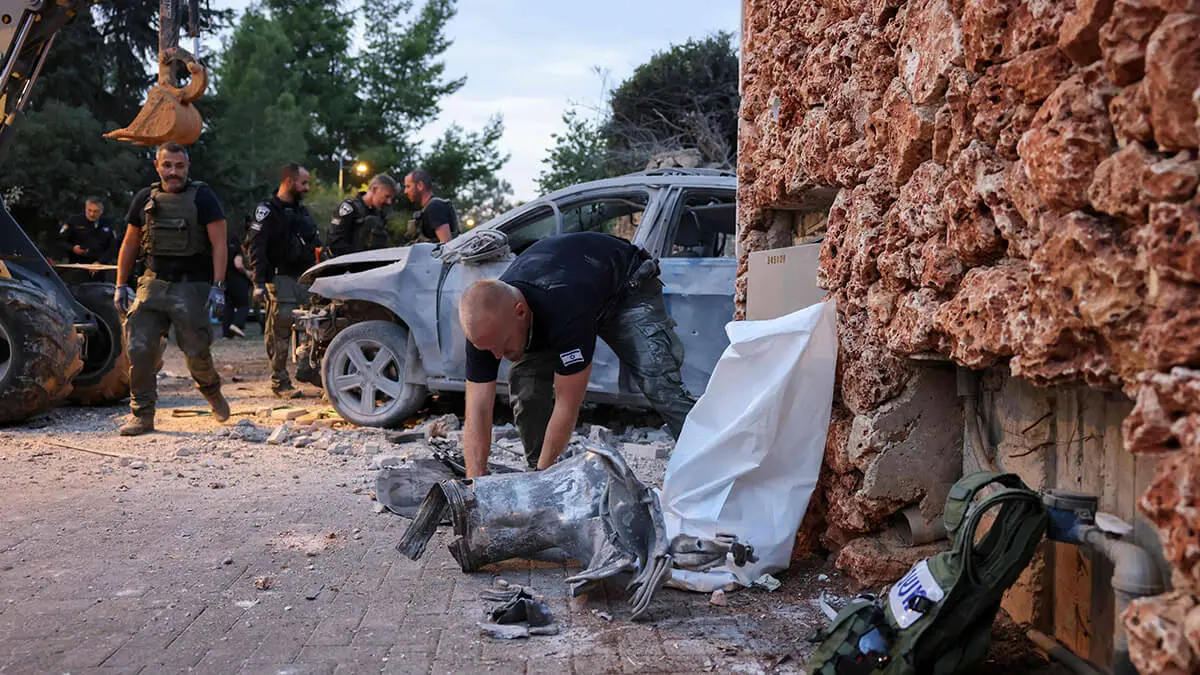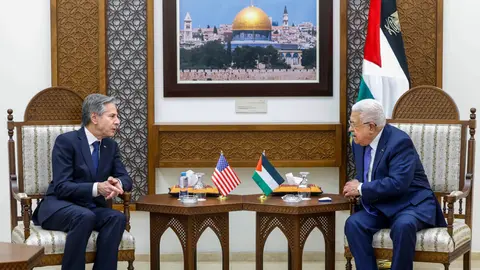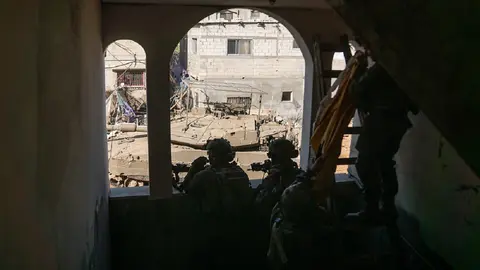"Israel is in the International Criminal Court for defending itself"

The hearing that will study South Africa's complaint against Israel for alleged genocide in the Gaza Strip begins at the International Criminal Court in The Hague. Meanwhile, hundreds of protesters – both pro-Israel and pro-Palestinian – gather near the court and in various parts of the Dutch city.
- “Hamas inflates death tolls and does not differentiate between terrorists and civilians”
- “Our enemies say they are going to repeat October 7 over and over again”
- “You cannot build peace when you have neighbors like Hezbollah or Hamas”
However, these hearings that will take place between today and tomorrow will not yet go into the merits of the case, and will only focus on the need to adopt precautionary measures to, according to South Africa, “protect the rights of the Palestinian people against greater, serious and irreparable” during the war between Israel and Hamas.
Happening now: over 1000 people march outside the International Court of Justice in the Hague in support of Israel 🇮🇱
— European Jewish Congress (@eurojewcong) January 11, 2024
Thank you, everyone, for standing in solidarity with Israel, the hostages and their families. pic.twitter.com/9nT4GM51CM
The court will not rule immediately on the genocide accusations, as those proceedings could take years. In this sense, it should be noted that ICC decisions are final and without the right to appeal, although the court has no way of enforcing them.
Today the ICC will hear South Africa's arguments, while Israel will respond to the accusations tomorrow, although from Jerusalem they have already stressed that this case has no basis, calling Pretoria the "lawyer" of Hamas. Aharon Barak, a prestigious 87-year-old jurist and opponent of Prime Minister Benjamin Netanyahu's controversial judicial reform, will represent Israel in The Hague.
A large protest is taking place in the Hague now showing support for South Africa's genocide case against Israel. pic.twitter.com/QHN3ZW6a5R
— Quds News Network (@QudsNen) January 11, 2024
On the eve of this hearing, Netanyahu assured that Israel “has no intention of permanently occupying Gaza or displacing its civilian population,” thus contradicting statements by far-right ministers about the return of Israeli settlements to Gaza.
“Israel is fighting Hamas terrorists, not the Palestinian population, and we are doing so in full compliance with international law,” added the Israeli prime minister in a message in English published on social networks.
"I want to make a few points absolutely clear:
— Prime Minister of Israel (@IsraeliPM) January 10, 2024
Israel has no intention of permanently occupying Gaza or displacing its civilian population.
Israel is fighting Hamas terrorists, not the Palestinian population, and we are doing so in full compliance with international law. pic.twitter.com/amxFaMnS0P
At the moment, countries such as Iran, Malaysia, Pakistan, Bangladesh and the Maldives have already expressed their support for South Africa's accusation against Israel for genocide, one of the most serious international legal accusations that can be made against a State.
To address this event, the European Jewish Association (EJA) has organized an information session that included the intervention of Yann Jurovics, specialist in crimes against humanity and crimes of genocide; Uzi Rabi, director of the Moshe Dayan Center for Middle Eastern Studies at Tel Aviv University; and Lieutenant Colonel Jonathan Conricus, international spokesman for the Israel Defense Forces.
Jurovics has noted that although the court may decide that there is no reason for provisional measures, the case will not be concluded for several years. “South Africa is asking for some measures and these will be decided in about 15 or 20 days,” he explains.
These accusations come three months after Hamas launched an attack by air, sea and land against Israel that left 1,200 dead, thousands injured and more than 200 people kidnapped. In response, the IDF began an air and ground offensive on the Gaza Strip in order to rescue the hostages - more than 100 Israelis remain kidnapped - and destroy Hamas infrastructure.
Israel’s Public Diplomacy Directorate wanted to pay to put these signs up around the Hague ahead of today’s ICJ hearing, but 10 different companies rejected the ad, probably for fear of vandalism. Well, no one can vandalize our tweets. Don’t look away. pic.twitter.com/c6cEG17s7A
— Lahav Harkov 🎗️ (@LahavHarkov) January 11, 2024
“Hamas inflates death tolls and does not differentiate between terrorists and civilians”
Israeli forces have eliminated numerous terrorists since the beginning of the operation, even going so far as to dismantle Hamas infrastructure in the north of the enclave. Likewise, tunnels, as well as weapons warehouses, have been located and destroyed. However, the war has also caused a serious humanitarian crisis in Gaza.
According to the territory's Hamas-run Health Ministry, more than 22,000 people have died as a result of the Israeli attacks. Israel, for its part, blames Hamas for the high number of civilian deaths in Gaza, accusing the terrorist group of using Gazans as "human shields."
The high figures provided by Hamas are one of the bases of the accusations of genocide against Israel. However, the Israeli authorities emphasize that these data are not “true.” “They only inflate the numbers and do not differentiate between combatants and civilians,” says Lieutenant Colonel Conricus, who recalls that Hamas fights against Israeli troops dressed as civilians.
More evidence of how Hamas embed themselves in Gaza’s civilian population:
— Eli Kowaz (@elikowaz) January 1, 2024
- Dress as civilians
- Hide RPGs under blankets
- Operate out of residential buildings pic.twitter.com/Im1CZmKWGg
“They only use uniforms in propaganda videos and parades, when they fight they dress like civilians and that can be seen in the videos that they themselves publish,” he says. This represents a major challenge in distinguishing between civilian victims and combatants.
Conricus also indicates that Hamas and other terrorist organizations in Gaza such as the Palestinian Islamic Jihad employ Gazans as “journalists” for propaganda work. In fact, many “journalists” working for international media entered Israeli territory with Hamas fighters on October 7, filming the atrocities committed by the terrorists, according to an investigation by Honest Reporting.
In this sense, the IDF has assured that the two journalists recently murdered in Gaza, Hamza al-Dahdouh and Mustafa Thuria - both from the Qatari channel Al Jazeera - were members of "terrorist organizations."
Confirmed: journalists Hamza al-Dahdouh and Mustafa Thuria were members of Gaza-based terrorist organizations.
— Israel Defense Forces (@IDF) January 10, 2024
On Jan 7, an IAF aircraft directed by troops targeted the operators of a drone, posing a threat to our soldiers near Rafah. The operators were later identified as… pic.twitter.com/JeYWwhJk9j
"Documents found by our troops in Gaza revealed Thuria's role as deputy squad commander in Hamas' Gaza City brigade, as well as Al-Dahdouh's role in the electronic engineering unit of the Islamic Jihad terrorist organization and previously as deputy commander in the Zeitun battalion," the Israeli Army states in a statement where it also shows the document that would demonstrate the relationship between both journalists and the terrorist groups.
Regarding this issue, Conricus highlights that “Israel has no intention of killing journalists.” The lieutenant colonel assures that when Israeli troops know that there are accredited journalists in an area, they do not attack it until they leave. “We make efforts not to attack journalists,” he insists.
Meet Gazan photojournalist Ashraf Amra. He's been working for media including @AP & @Reuters.
— HonestReporting (@HonestReporting) January 8, 2024
Here he is on Oct. 7 enjoying fellow photojournalist Mohammed Fayq Abu Mostafa's footage of an IDF soldier being lynched after they both infiltrated Israel's border. And there's more.🧵 pic.twitter.com/Ec31bC3Zuy
“Our enemies say they are going to repeat October 7 over and over again”
The IDF spokesperson has also spoken out about genocide accusations against Israel, stating that his country is in the ICC for defending itself. Hamas leaders, before and after October 7, have called for attacking Israelis and Jews on several occasions, even calling for the destruction of Israel.
Hamas Official Ghazi Hamad: We Will Repeat the October 7 Attack Time and Again Until Israel Is Annihilated; We Are Victims - Everything We Do Is Justified #Hamas #Gaza #Palestinians pic.twitter.com/kXu3U0BtAP
— MEMRI (@MEMRIReports) November 1, 2023
“Our enemies say that they are going to repeat October 7 over and over again,” emphasizes Conricus, recalling that Hamas, Islamic Jihad and Hezbollah launch recurring attacks against Israeli territory, firing missiles at population centers, something that violates international laws.
Instead, according to Conricus, Israeli forces act in accordance with the law and are trained and educated in accordance with humanitarian law.
Uzi Rabi, for his part, wanted to clarify that this war is not about Israel against Hamas, but about Israel - and the free world - against the so-called Axis of Resistance, led by the Islamic Republic of Iran. “Tehran should be seen as an octopus,” emphasizes Rabi, referring to its multiple links with armed groups in the Middle East, such as Hamas, Hezbollah, the Houthis or pro-Iranian militias in Iraq and Syria.
New round of rocket attacks just now in Tel Aviv. pic.twitter.com/FtyxrB8XK5
— Mark Griffin (@Mark_Freelance) January 8, 2024
“You cannot build peace when you have neighbors like Hezbollah or Hamas”
Rabi considers that, facing the Axis of Resistance, there is another alliance led by Saudi Arabia that includes several countries that maintain relations with Israel, such as Egypt, Jordan, Bahrain, Morocco and the United Arab Emirates.
This pro-Western alliance is against the Iranian regime, the Muslim Brotherhood and Hamas. “That is why Israel is not an enemy, but a partner of this group,” Rabi declares.
IDF airstrikes on two Hezbollah positions in southern Lebanon overnight, January 9-10.
— Imtiaz Mahmood (@ImtiazMadmood) January 11, 2024
An IDF fighter jet struck terrorist infrastructure and a military compound in the area of Labbouneh in southern Lebanon. In addition, an IDF fighter jet struck a military command center in… pic.twitter.com/HFomH9lMdG
Regarding the end of the war, Rabi explains that if Israel fails in its goal of eliminating Hamas, “it will be a disaster for Israel's prestige” and will change the way Arab countries and others view the Jewish state.
However, if Hamas disappears as an organization, it will be the first step in creating a platform to build a new reality in the region. “You cannot build peace when you have neighbors like Hezbollah or Hamas,” concludes Rabi, who before ending his speech also takes the opportunity to warn of the danger of fake news, disinformation and Qatari money that reaches Western university campuses.










